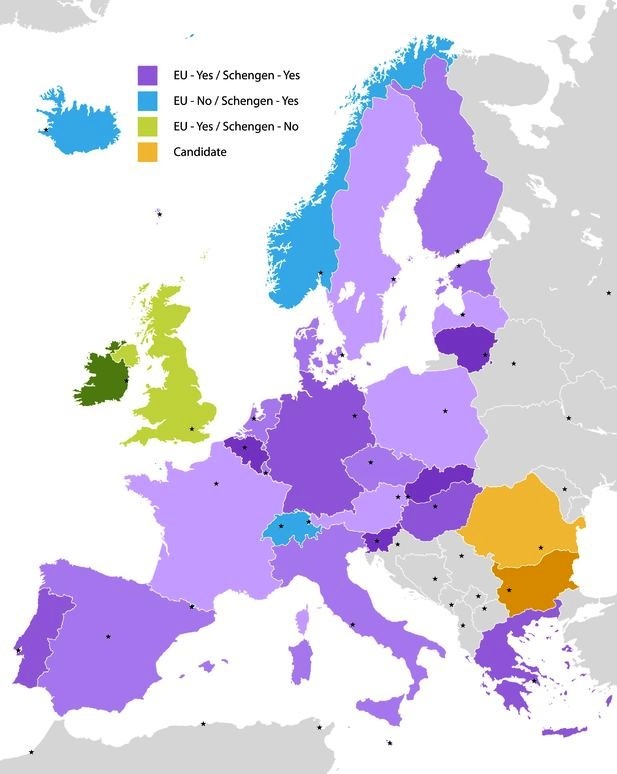The world is full of red tape, that’s pretty much all there is to it. It can be overwhelming, and unnerving setting out on an adventure not knowing what the legal requirements are going from place to place. Your mind might flash with visions of your family winding up in a Turkish Prison, or being interrogated in a dingy room somewhere. I hope this article sheds a little light on our experiences, and what we’ve learned from several years of family travel. First off, it’s important to keep in mind, that most likely, unless you’re planning to visit North Korea, the people you will encounter at the borders are just like you and me. They have families, they are staring at the clock all day, waiting to get off work and go do something else. It’s actually something to keep in the front of your mind as you go, because if the opportunity present itself, you can ask them about their hobbies, their family, whatever to lighten the mood. It works! I can also attest to what else works: just the fact hat you are there with your family. I’ve been in many border crossings, visa offices, whatever, and the mood is way different when I’ve brought my kids in then when I haven’t. That’s the whole point of family travel!

Fixed travel plans or flexible schedule?
It’s sometimes difficult if you will be traveling for an extended trip, not necessarily planning out every step of the way. If that’s the case, you can’t research every country beforehand to know their visa requirements, their bureaucracy, or what you will be faced with. The good news is that with the internet, and the mountains of information out there, it is possible to find more than just the official legalese to dig through, there are scores of groups and useful “unofficial” information, which is sometimes more accurate and more current. An example of this is when we were living in Costa Rica for 18 months. The government was constantly changing their rules on border crossings, and visa requirements, and it was difficult to keep up with what was being currently enforced, and what was not. We had heard rumors that they would not allow foreigners (like us) to use the same border exit and re-entry each 90 days. In other words, you could go through to Nicaragua this time, but next time, you had to go to either Panama, or fly somewhere, or who knows? We couldn’t find an answer, and in the end, just went for it through the border to Nicaragua. In our case, there were so many strange changes, so often, even the folks at the border rarely knew the latest intel or procedure.
Here’s a great “official” starting point to what countries might require for the visa process: “US Citizens Traveling Abroad” It will at least get you familiar with which countries might be a bit easier for starting out, and what countries are more strict.
During our boat adventure, we found scores of other boaters who were a wealth of knowledge about getting in and out of borders. They had either been there before if they were familiar with the area we were sailing, or we used an amazing resource for sailors called: Noonsite. It is maintained by the sailing community and has details on getting in and out of countries, visa requirements, even information about pirates, marina, what food should cost, etc. It was extremely useful for us as we researched the next country we were heading to, or even considering. The information was also current with dated reviews by other sailors.
Are Longer Stays Possible?

Some goals are to be able to stay in a particular country or region (Europe) for longer than the typical 90 days. Maybe even entertaining the thought of working abroad, which we deal with in another blog post. This is a great option if you plan to stay in one place for a while and re-fill the travel funds! Obviously, it’s much easier to stay in some countries than others, and it’s tough to make blanket statements on how or what is possible. All I know is: “where there’s a will there’s a way” usually applies here. Overall, it is not an easy undertaking, as there is many issues about foreigners being perceived as taking local jobs, etc. I have been surprised by what some of our guests have been able to arrange for working and living abroad. A great resource for this is someone like: Expat Exchange, who have loads of information about exactly that, living and working abroad. Which brings us to Europe!
What the Shengen is the “Shengen Treaty?”

This is about as confusing as it gets. The Shengen Treaty was a treaty signed by 25 countries, but not all countries in Europe to make passage between their countries easier for tourists and business. You can visit several countries on one visa and not required to get visas for each country. This website: SchengenVisa is a fantastic resource for all things Shengen. There’s little else I could add. Be sure and check out their FAQ page for more information. If you just want the pff for the application, you can find that here: Shengen Application
Here’s a totally new development which promises to be a real game changer for anyone wanting to go to Europe for long term. Estonia’s new plan to bring business and allow foreigners to hold a second passport, also allowing them basically free access to much of Europe, without a lot of headaches. Here’s an article, which explains some more, and is definitely be something I will be watching in the months to come! Estonia Article for citizenship?
I hope these ideas helped. We’ll be digging up more information about visas and be adding to the site, We’d love to hear from you about what information would be most useful to you as as your planning a trip.
What country would you most love to visit?







